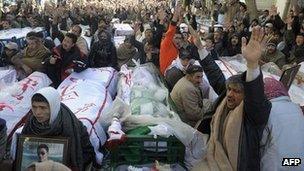Pakistan blasts: Government tries to placate Shia protesters
- Published

Pakistani officials are holding crisis talks with Shia protesters in the city of Quetta, who are demanding protection after bomb blasts killed nearly 100.
The talks come as the minority Shia community have refused to bury the dead, barricading a road with coffins of the victims for a second day.
Sunni militant group Lashkar-e-Jhangvi said it carried out the deadliest of Thursday's attacks killing at least 85.
The militants have previously targeted the area's Hazara Shia.
Extreme protest
Two federal ministers and the governor Balochistan province are negotiating with the protesters in the regional capital to try to defuse the row.
However, no breakthrough has been reported so far.
Wrapped up against the winter cold, the demonstrators are continuing to block the road close to the snooker hall which was the target of the deadliest attacks.
Laid out in between them are the shrouded bodies of about 50 victims of the bombing.
Most of the dead were from Quetta's 500,000-strong Hazara Shia. Originally from Afghanistan, the community has established itself in the city over several generations.
The president of the Shia Conference, Syed Dawood Agha, told the BBC that his community would not bury its dead till the army had given an assurance it would take administrative control of the city.
A relative of one of the victims, Fida Hussain, said: "We want safety for our all sects, and all security measures should be taken for our safety. We will not bury them until the government fulfils all our demands."
The refusal to bury the dead is an extreme protest in Islamic society, where people are normally buried the same day they die.
Balochistan Governor Nawab Zulfiqar Magsi admitted that the authorities "have no right to rule" after the attacks - on one of the deadliest days of bombings in Pakistan in recent years.
Three days of mourning have been announced in Balochistan.
Balochistan is plagued by a separatist rebellion as well as the sectarian infighting.
The Taliban and armed groups that support them also carry out attacks in the province, particularly in areas near the Afghan border.
- Published12 January 2013
- Published11 January 2013
- Published4 October 2011
- Published10 January 2013
- Published15 March